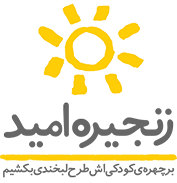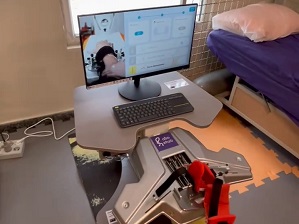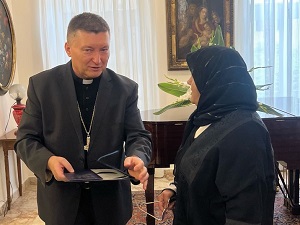An Enhanced cooperation of La Chande de Lespoir in France with Zanjireh Omid charity institute in Tehran in an interview with Ms. Francoise Monard
An Enhanced cooperation of La Chande de Lespoir in France with Zanjireh Omid charity institute in Tehran in an interview with Ms. Francoise MonardWednesday, November 12, 2014
Coordinator in Iran and General Manager of the Chain of Hope of France, Francois Menard talks about the activities of the Chain of Hope of France, the experiences and the memories in Iran.
According to Francois Menard, at the beginning it seemed that he had doubts about the cooperation with the Iranians and especially with an Iranian woman. But now, after six years, he loves his job so that he invites his friends to visit Iran and try to change their ideas about Iran and Iranians. The close cooperation between the charitable institution of the Chain of Hope of Iran and humanitarian institution of the Chain of Hope of France has been developed with the contribution of Francois Menard and most of today's results of the institution would never have been achieved without his presence and his efforts on collaboration between the Institution of Iran and France.
How many years do you have volunteer and charitable activities?
I have worked voluntarily for treatment and education of poor children for 20 years.
What made you get into this field?
I'm not Muslim; I’m a Catholic; maybe a religious feeling. As a rich man I felt I should help poor people.
Please explain a little bit about the Chain of Hope of France. In which countries is it active?
Chain of Hope was founded by Prof. Alain Deloche, me and three others, which mission is to provide health care for poor children from all around the world. At first, the needy children in poor countries have been sent to Paris to be treated by a medical team of the institution. Later and gradually, sending the medical teams to the various regions for treatment began. These teams make the treatment training and the medical care available to local doctors while treating children.
Nowadays the institution sends the international medical experts to different countries and has the medical educational activities. It also builds the modern and well-equipped hospitals in different countries. For example, in Kabul, Afghanistan, Chain of Hope has built a large hospital. In Cambodia, Mozambique and other countries, the Chain of Hope has built the hospitals that are currently active.
What is your collaboration with Iran?
Ms. Marashi met Professor Mazda in France. I think he had operated one of Mrs. Marashi’s relatives. Professor Mazda, with the Iranian-French nationality, worked with the Chain of Hope of France and explained the activities of this institution to Mrs. Marashi. The idea of creating such an institution was created at that time and Mrs. Marashi decided to establish the Chain of Hope at Tehran. We had a meeting with Maryam Marashi and she invited Professor Alain Deloche, pervious director and founder of the Chain of Hope of France, and Eric Cheysson, current director of the Institution Chain of hope, to come to Iran. During the trip, a joint agreement was first signed, and after the legal steps, the Chain of Hope, inspired by the close collaboration of the Chain of Hope of France, was established in Iran. A year later, Keyvan Mazda contacted me and said I think: You are the only person in the Chain of Hope of France that can work with Maryam Marashi. Because Ms. Marashi is a strong woman and a powerful man is needed to work with. He asked me if I agree to do so. I told him that I should go to Iran. So I came to Iran and I found that there was no problem for working with Maryam. During the first three years of our collaboration, there were only the missions of international medical teams in Iran. But gradually, Iranian doctors’ missions for training courses began in France. In addition, last year, our efforts to raise funds from international sources, for the projects in the Chain of hope, were started at the same time such as the children's home project in the Chain of Hope.
How do you feel working for children?
It is unexplainable. I have no children, so the children around the world are my children.
One of the best moments?
I have great memories. Maybe when an open heart surgery was performed for the first time in the hospital of Chain of Hope at Kabul. In addition, the establishment of the Chain of Hope is a most honorable achievement for me.
What suggestions do you have for the Chain of Hope in Iran?
I have many suggestions. Ms. Marashi is a great person with her unique features and a strong spirit. In France, it is believed that Iranian women are very shy and passive, they are trapped behind their sails and they don’t do significant works. But the first time that I met her and I found the way she speaks with doctors and handles them, I found her respectful, powerful and stable.
According to Francois Menard, at the beginning it seemed that he had doubts about the cooperation with the Iranians and especially with an Iranian woman. But now, after six years, he loves his job so that he invites his friends to visit Iran and try to change their ideas about Iran and Iranians. The close cooperation between the charitable institution of the Chain of Hope of Iran and humanitarian institution of the Chain of Hope of France has been developed with the contribution of Francois Menard and most of today's results of the institution would never have been achieved without his presence and his efforts on collaboration between the Institution of Iran and France.
How many years do you have volunteer and charitable activities?
I have worked voluntarily for treatment and education of poor children for 20 years.
What made you get into this field?
I'm not Muslim; I’m a Catholic; maybe a religious feeling. As a rich man I felt I should help poor people.
Please explain a little bit about the Chain of Hope of France. In which countries is it active?
Chain of Hope was founded by Prof. Alain Deloche, me and three others, which mission is to provide health care for poor children from all around the world. At first, the needy children in poor countries have been sent to Paris to be treated by a medical team of the institution. Later and gradually, sending the medical teams to the various regions for treatment began. These teams make the treatment training and the medical care available to local doctors while treating children.
Nowadays the institution sends the international medical experts to different countries and has the medical educational activities. It also builds the modern and well-equipped hospitals in different countries. For example, in Kabul, Afghanistan, Chain of Hope has built a large hospital. In Cambodia, Mozambique and other countries, the Chain of Hope has built the hospitals that are currently active.
What is your collaboration with Iran?
Ms. Marashi met Professor Mazda in France. I think he had operated one of Mrs. Marashi’s relatives. Professor Mazda, with the Iranian-French nationality, worked with the Chain of Hope of France and explained the activities of this institution to Mrs. Marashi. The idea of creating such an institution was created at that time and Mrs. Marashi decided to establish the Chain of Hope at Tehran. We had a meeting with Maryam Marashi and she invited Professor Alain Deloche, pervious director and founder of the Chain of Hope of France, and Eric Cheysson, current director of the Institution Chain of hope, to come to Iran. During the trip, a joint agreement was first signed, and after the legal steps, the Chain of Hope, inspired by the close collaboration of the Chain of Hope of France, was established in Iran. A year later, Keyvan Mazda contacted me and said I think: You are the only person in the Chain of Hope of France that can work with Maryam Marashi. Because Ms. Marashi is a strong woman and a powerful man is needed to work with. He asked me if I agree to do so. I told him that I should go to Iran. So I came to Iran and I found that there was no problem for working with Maryam. During the first three years of our collaboration, there were only the missions of international medical teams in Iran. But gradually, Iranian doctors’ missions for training courses began in France. In addition, last year, our efforts to raise funds from international sources, for the projects in the Chain of hope, were started at the same time such as the children's home project in the Chain of Hope.
How do you feel working for children?
It is unexplainable. I have no children, so the children around the world are my children.
One of the best moments?
I have great memories. Maybe when an open heart surgery was performed for the first time in the hospital of Chain of Hope at Kabul. In addition, the establishment of the Chain of Hope is a most honorable achievement for me.
What suggestions do you have for the Chain of Hope in Iran?
I have many suggestions. Ms. Marashi is a great person with her unique features and a strong spirit. In France, it is believed that Iranian women are very shy and passive, they are trapped behind their sails and they don’t do significant works. But the first time that I met her and I found the way she speaks with doctors and handles them, I found her respectful, powerful and stable.




